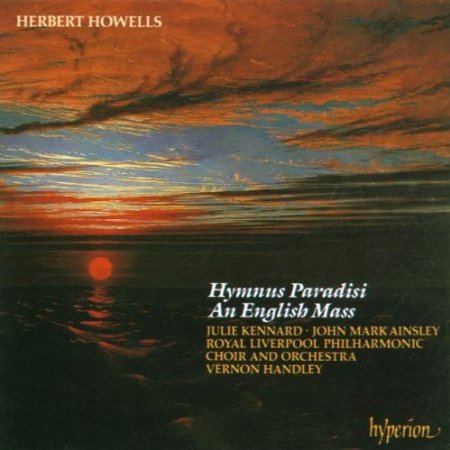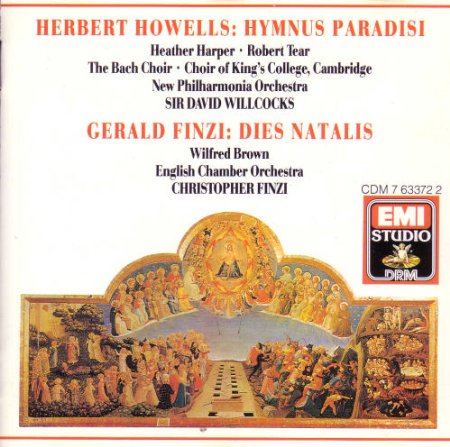Finzi/Howells Vocal Works
View record and artist detailsRecord and Artist Details
Composer or Director: Herbert Howells
Genre:
Vocal
Label: Hyperion
Magazine Review Date: 5/1992
Media Format: CD or Download
Media Runtime: 80
Mastering:
DDD
Catalogue Number: CDA66488

Tracks:
| Composition | Artist Credit |
|---|---|
| Hymnus Paradisi |
Herbert Howells, Composer
Herbert Howells, Composer John Mark Ainsley, Tenor Julie Kennard, Soprano Liverpool Philharmonic Choir Royal Liverpool Philharmonic Orchestra Vernon Handley, Conductor |
| (An) English Mass |
Herbert Howells, Composer
Herbert Howells, Composer Liverpool Philharmonic Choir Royal Liverpool Philharmonic Orchestra Vernon Handley, Conductor |
Composer or Director: Herbert Howells, Gerald (Raphael) Finzi
Label: Studio
Magazine Review Date: 5/1992
Media Format: CD or Download
Media Runtime: 69
Mastering:
ADD
Catalogue Number: 763372-2

Tracks:
| Composition | Artist Credit |
|---|---|
| Hymnus Paradisi |
Herbert Howells, Composer
Bach Choir David Willcocks, Conductor Heather Harper, Soprano Herbert Howells, Composer King's College Choir, Cambridge New Philharmonia Orchestra Robert Tear, Tenor |
| Dies natalis |
Gerald (Raphael) Finzi, Composer
Christopher Finzi, Conductor English Chamber Orchestra Gerald (Raphael) Finzi, Composer Wilfred Brown, Tenor |
Author:
The pain is real enough, as biographical facts attest. Howells wrote it as a method of escape from ''the crippling numbness of loss,'' as he described the effect upon him of his son's death from polio at the age of ten. The work was so full of the emotion of that time that for many years it had to remain private, and it was only with the approach of the fifteenth anniversary of the death that he showed it to Vaughan Williams and arrangements were made for its inclusion in the Three Choirs Festival of 1950. A work of art should stand on its own, no doubt (and this one does), but, knowing its human cause, one can see more readily the purpose, and hence the form and structure, of its lingering over the single sentence of ''Requiem aeternam''. The abrupt ferocities, a rebellion in the face of cruel fact, can also be recognized as stages in the musical progression, less arbitrary than they perhaps at first appeared.
A strong performance helps, and both of these, the old and the new, have their own strengths. Vernon Handley brings an intensity that shows up when the two are put side by side: there is a feeling for the dramatic quality in the score, the crises and relaxations, without losing sight of the essential lyricism. With Willcocks the sense of sympathy is complete, and no doubt the presence of the composer, with a former pupil of his, Kinloch Anderson, as producer, made the occasion a special one. I see myself going back to both, choosing the Handley for its intensity and clarity of structure and orchestral detail, the Willcocks for the more forward presence of the choir and for the radiant singing of Heather Harper. The soloists on the new recording sing with sensitivity and pleasing tone, but Harper sounds out as the very embodiment of that ''light and warmth of consolation'' which the composer noted as becoming eventually pervasive.
In many ways, the English Mass has a natural kinship here. Written in 1955 for Harold Darke and his St Michael's Singers, it is richly scored (the optional instruments being included) and is probably too expansive for liturgical use. As a symphonic structure, the Anglican placing of the Gloria at the end, instead of following the Creed, is far more satisfying, and the work balances well its elements of prayer and praise. Again the performance carries conviction, though again one could wish for a more forward placing of the choir.
Aptly paired in the Willcocks version is Finzi's Dies natalis, with the composer's son conducting. Though originally performed with a soprano soloist (Elsie Suddaby) and first recorded by Joan Cross, it is better suited to the tenor voice, and Wilfred Brown's well-focused tone, natural production and clear enunciation serve admirably: it is a performance very close to the heart of this work, which with its gentle exultation grows steadily in the affections.'
Discover the world's largest classical music catalogue with Presto Music.

Gramophone Digital Club
- Digital Edition
- Digital Archive
- Reviews Database
- Full website access
From £8.75 / month
Subscribe
Gramophone Full Club
- Print Edition
- Digital Edition
- Digital Archive
- Reviews Database
- Full website access
From £11.00 / month
Subscribe
If you are a library, university or other organisation that would be interested in an institutional subscription to Gramophone please click here for further information.




